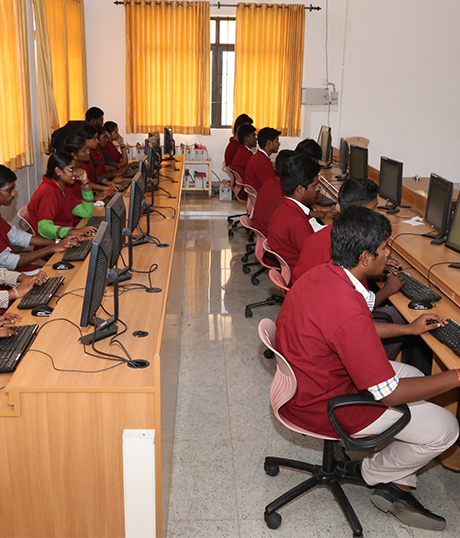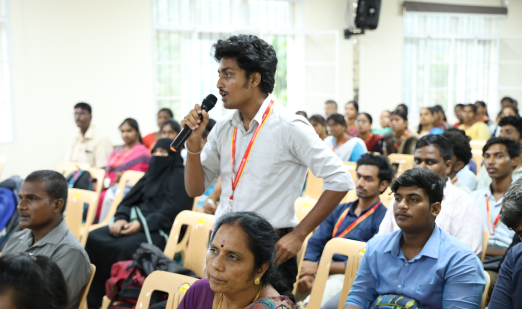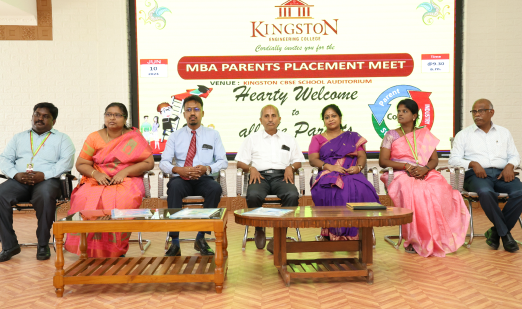Mechanical engineering
Department Introduction
The department of Mechanical Engineering was established in the year 2009. The department offers B.E (Mechanical Engineering) from the academic year 2009 – 2010, M.E (Engineering Design) from the academic year 2013 – 2014 and M.E (Energy Engineering) from the academic year 2013– 2014. The department became an approved research center of Anna University in the year 2017. The department has highly qualified and experienced faculty members with Ph.D. degree. The faculty members actively engage in research and constantly publish papers in International and National Journals. The department organizes technical workshops, Seminar/Conference for the faculty members to meet the recent emerging trends. The department has the state of the art facilities for various laboratories, classrooms to support e-learning and department library.
The department has a well equipped centralized workshop facility which caters to the needs of various departments. Industry Experts, Eminent Professor from Premier Educational Institutes are invited regularly to conduct Guest lectures and workshop for the students to supplement their curriculum. The department also provides exposure to increase all around excellence among students by participating in Co curricular and extracurricular activities.
- B.E. (Mechanical Engineering)
- M.E. (Mechanical Engineering)


Vision Of The Department
- The department of Mechanical Engineering strives to develop skilled, competent, ethical and versatile mechanical engineers capable of designing, developing and analyzing the complex problems and implementation of emerging engineering technologies, to solve the real time problems.

Mission Of The Department
- To impart quality education to the students to build their capacity and enhance their skills to make them globally competitive mechanical engineers.
- To maintain a vital, state-of-the-art research enterprise to provide our students and faculty with opportunities to create, interpret, apply and disseminate knowledge.
- To prepare our graduates to pursue life-long learning, serve the profession and society and develop intellectual, ethical and career challenges.
/B.E. Mechanical Engineering
Engineering Graduates will be able to :
| PSO | Programme Outcomes |
|---|---|
| PO1 | Engineering Knowledge : Apply the knowledge of mathematics, science, engineering fundamentals, and an engineering specialization to the solution of complex engineering problems. |
| PO2 | Problem Analysis : Identify, formulate, review research literature, and analyze complex engineering problems reaching substantiated conclusions using first principles of mathematics, natural sciences, and engineering sciences. |
| PO3 | Design/Development Of Solutions : Design solutions for complex engineering problems and design system components or processes that meet the specified needs with appropriate consideration for the public health and safety, and the cultural, societal, and environmental considerations |
| PO4 | Conduct Investigations Of Complex Problems : Use research-based knowledge and research methods including design of experiments, analysis and interpretation of data, and synthesis of the information to provide valid conclusions. |
| P05 | Modern Tool Usage : Create, select, and apply appropriate techniques, resources, and modern engineering and IT tools including prediction and modeling to complex engineering activities with an understanding of the limitations. |
| P06 | The Engineer and Society : Apply reasoning informed by the contextual knowledge to assess societal, health, safety, legal and cultural issues and the consequent responsibilities relevant to the professional engineering practice. |
| P07 | Environment and Sustainability : Understand the impact of the professional engineering solutions in societal and environmental contexts, and demonstrate the knowledge of, and need for sustainable development. |
| P08 | Ethics :Apply ethical principles and commit to professional ethics and responsibilities and norms of the engineering practice. |
| P09 | Individual and Team Work : Function effectively as an individual, and as a member or leader in diverse teams, and in multidisciplinary settings. |
| P10 | Communication : Communicate effectively on complex engineering activities with the engineering community and with society at large, such as, being able to comprehend and write effective reports and design documentation, make effective presentations, and give and receive clear instructions. |
| P11 | Project Management and Finance : Demonstrate knowledge and understanding of the engineering and management principles and apply these to one’s own work, as a member and leader in a team, to manage projects and in multidisciplinary environments. |
| P12 | Life-long Learning : Recognize the need for, and have the preparation and ability to engage in independent and life-long learning in the broadest context of technological change. |
Bachelor of Mechanical Engineering curriculum is designed to impart Knowledge, Skill and Attitude on the graduates to
| PEO | Programme Educational Objectives |
|---|---|
| PEO1 | Have a successful career in Mechanical Engineering and allied industries. |
| PEO2 | Have expertise in the areas of Design, Thermal, Materials and Manufacturing. |
| PEO3 | Contribute towards technological development through academic research and industrial practices. |
| PEO4 | Practice their profession with good communication, leadership, ethics and social responsibility. |
| PE05 | Graduates will adapt to evolving technologies through life-long learning. |
| PSO | Programme Specific Outcomes |
|---|---|
| PSO1 | Professional Engineers : To produce engineering professionals capable of synthesizing and analysing mechanical systems including allied engineering streams. |
| PSO2 | Employability Skills : Ability to adopt and integrate current technologies in the design and manufacturing domain to enhance employability. |
/M.E. Computer Science And Engineering
| PSO | Programme Outcomes |
|---|---|
| PO1 | Engineering Knowledge : Apply the knowledge of mathematics, science, engineering fundamentals, and an engineering specialization to the solution of complex engineering problems. |
| PO2 | Problem Analysis : Identify, formulate, review research literature, and analyze complex engineering problems reaching substantiated conclusions using first principles of mathematics, natural sciences, and engineering sciences. |
| PO3 | Design/Development Of Solutions : Design solutions for complex engineering problems and design system components or processes that meet the specified needs with appropriate consideration for the public health and safety, and the cultural, societal, and environmental considerations |
| PO4 | Conduct Investigations Of Complex Problems : Use research-based knowledge and research methods including design of experiments, analysis and interpretation of data, and synthesis of the information to provide valid conclusions. |
| P05 | Modern Tool Usage : Create, select, and apply appropriate techniques, resources, and modern engineering and IT tools including prediction and modeling to complex engineering activities with an understanding of the limitations. |
| P06 | The Engineer and Society : Apply reasoning informed by the contextual knowledge to assess societal, health, safety, legal and cultural issues and the consequent responsibilities relevant to the professional engineering practice. |
| P07 | Environment and Sustainability : Understand the impact of the professional engineering solutions in societal and environmental contexts, and demonstrate the knowledge of, and need for sustainable development. |
| P08 | Ethics :Apply ethical principles and commit to professional ethics and responsibilities and norms of the engineering practice. |
| P09 | Individual and Team Work : Function effectively as an individual, and as a member or leader in diverse teams, and in multidisciplinary settings. |
| P10 | Communication : Communicate effectively on complex engineering activities with the engineering community and with society at large, such as, being able to comprehend and write effective reports and design documentation, make effective presentations, and give and receive clear instructions. |
| P11 | Project Management and Finance : Demonstrate knowledge and understanding of the engineering and management principles and apply these to one’s own work, as a member and leader in a team, to manage projects and in multidisciplinary environments. |
| P12 | Life-long Learning : Recognize the need for, and have the preparation and ability to engage in independent and life-long learning in the broadest context of technological change. |
Graduates of M. E. Computer Science and Engineering will be able to,
| PEO | Programme Educational Objectives |
|---|---|
| PEO1 | To enable graduates to pursue research, or have a successful career in academia or industries associated with Computer Science and Engineering, or as entrepreneurs. |
| PEO2 | To provide students with strong foundational concepts and also advanced techniques and tools in order to enable them to build solutions or systems of varying complexity. |
| PEO3 | To prepare students to critically analyze existing literature in an area of specialization and ethically develop innovative and research oriented methodologies to solve the problems identified. |
| PSO | Programme Specific Outcomes |
|---|---|
| PSO1 | To analyze, design and develop computing solutions by applying foundational concepts of computer science and engineering. |
| PSO2 | To apply software engineering principles and practices for developing quality software for scientific and business applications. |
| PSO3 | To adapt to emerging information and communication technologies (ICT) to innovate ideas and solutions to existing/novel problems. |
College Academic Calender
R2013-B.E-MECH
Download PdfR2013-M.E-MECH
Download PdfR2017-B.E-MECH
Download PdfR2017-M.E-MECH
Download PdfR2021-B.E-MECH
Download PdfR2021-M.E-MECH
Download PdfPatents
| S.No | Applicant Name(s) | Inventor Name(s) | Title | Application No. & Patent Filed Date | Status |
|---|---|---|---|---|---|
| 1 | Dr. V. Mohanavel, Dr. M.Ravichandran, Dr. P. Ganeshan, Mr. S. Suresh Kumar, Mrs. S. Jeya Bharathi. | Dr. K.Rajan, Dr. K.S.Ashraff Ali, Dr. M.Mohamed Abdul Hafeez, Dr. S. Saravana Kumar, Mr. J.Vairamuthu, Mr. V.Ananda Natarajan, Dr. V. Mohanavel. | A System And Method For Monitoring And Processing Wastewater And Rainwater Harvesting In Formal Habitation | 201941036236 A 20.09.2019 | Published |
| 2 | Dr.N. Shankar Ganesh | N. Shankar Ganesh, S. Mahendiran, D. Manivannan, N. Keerthivarman. | Combined Thermodynamic Cycle Based Power Generation System And A Method Thereof | 201941009276 A 10.03.2019 | Published |
| 3 | Dr.N. Shankar Ganesh | N. Shankar Ganesh, Venkatachari, Srinivas, Maruthamuthu, Ravi kumar, Gunasekairan, Uma Maheswari | Thermodynamic cycle based power generation system and a method Thereof | 201741046830 A 27.12.2017 | Published |
| 4 | Dr.N. Shankar Ganesh | Dr. K. S. Giridharan, | Combined Renewable Energy Based Heat, Power Generation and Cooling System and A Method Thereof | 201941040473 | Filed |
| 5 | Dr.V.Mohanavel, S.Mallikarjunaiah, K.Subbaramaiah, P.Ganeshan, S.Suresh Kumar, S.Rudramoorthy, Anita Titus, M.Umadevi, B.Dhiyanesh, T.Santhana Krishnan. | Dr.V.Mohanavel, S.Mallikarjunaiah, K.Subbaramaiah, P.Ganeshan, S.Suresh Kumar, S.Rudramoorthy, Anita Titus, M.Umadevi, B.Dhiyanesh, T.Santhana Krishnan. | System and Method for cooking food items | 201941030758 30.07.2019 | Filed |
List of Mou's
| S.No | Mou's |
|---|---|
| 1 | MoU with Voltech, Chennai – Internship for Students, Training for Faculty members. |
| 2 | MoU with BGR Energy Ltd, Chennai –Internship for Students, Training for Faculty members. |
| 3 | MoU with KKM Soft, Chennai–Software Training for Students, Training for Faculty members. |
| 4 | MoU with Emerald Resilient Tyre Manufacturers – Placement for students |
| 5 | MoU with Caparo Engineering Private Limited – Placement for students |
| S.No | Academic Year | Project Code | Title of the Project | Student Name | Guide Name | Amount Rs. |
|---|---|---|---|---|---|---|
| 1 | 2018-2019 | EME - 020 | Chainless bicycle using kinematic inversions | N.Pushparaj, G.Puviarasan | Dr.N.Shankarganesh | 7500/- |
| 2 | 2017-2018 | EME - 020 | Automatic signal alerting, alarming and braking system for trains using machine vision technique | R.Vignesh, B.Sankar, V.Pavithra | Prof.S.Mahendiran | 10000/- |
| S.No | Project Title | Funding Agency | Duration | Amount Received | Faculty involved | Status |
|---|---|---|---|---|---|---|
| 1 | Grant for Organizing Conference | TNSCST | 2017-2018 | 20000 | Dr.N.Shankarganesh | Completed |
| 2 | Grant for Organizing Conference | AICTE | 2019-2020 | 500000 | Dr.N.Shankarganesh | In progress |
| 3 | Effective teaching Strategies in Engineering Education (STTP) | AICTE | 2019-2020 | 227000 | Dr.N.Shankarganesh | In progress |
| 4 | MODROBS | AICTE | 2018-2019 | 450000 | Dr.N.Shankarganesh | Expert Evaluation Completed |
| 5 | RPS- Research Promotion Scheme | AICTE | 2018-2019 | 2475000 | Dr.N.Shankarganesh | Expert Evaluation Completed |
| 6 | GOC - Grant for Organizing Conference | AICTE | 2018-2019 | 500000 | Dr.N.Shankarganesh | Expert Evaluation Completed |
| 7 | STTP – Short Term Training Program | AICTE | 2018-2019 | 300000 | Dr.N.Shankarganesh | Expert Evaluation Completed |
| 8 | Solar driven cogeneration system for low temperature applications | TNSCST | 2019-2020 | 528000 | Prof. S.Mahendiran | Awaiting |
| 9 | Eco Friendly Solar Energy Driven Power Generation System | TNSCST | 2019-2020 | 488000 | Dr.N.Shankar Ganesh | Awaiting |
| 10 | Development and Experimental Analysis of a Novel Kalina Power Station Suitable for Low Temperature Applications | ASEAN | 2018-2019 | 1521000 | Dr.N.Shankar Ganesh | Awaiting |
| 11 | Experimental investigation of improved solar powered Kalina power system at Indian climatic conditions | SERB | 2018-2019 | 3206310 | Dr.N.Shankar Ganesh | Awaiting |


